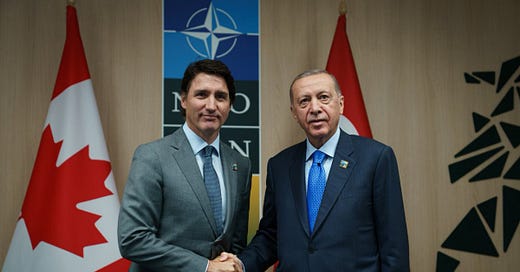NATO Time
When I attended the annual Canada Day ceremony in my local town earlier this month we had the privilege of our member of parliament being present and giving a short speech. Fairly normal, nothing overly political going on, you’d think. Sure enough it was a fairly generic speech until the moment he waded into foreign policy and underlined that Canada is a ‘neutral’ country. Really? Canada is not a founding member of NATO? Canadians can position themselves as neutral whenever they like? Not sure about that, and while everyone knows Canada is not neutral, the current government (its leader pictured above with Turkey’s Erdogan at this week’s NATO summit) somehow likes to play this card for whatever political reasons. It does have consequences going beyond Canada’s borders though and together with paying a minimal amount to meet NATO’s defence spending targets the north country is not making friends among those that are nominally its allies. And in the case of the US a country that actually helps provide security for Canada. Things like this come back to haunt you rapidly, like being excluded from the recently launched AUKUS security pact for which Canada would be a natural, strategic and logical fit.
In any case, Trudeau made his way to Vilnius for the NATO Summit where one of the key issues was to discuss a more defined and potentially accelerated timeline for Ukraine to become a member of the now 31 nation strong defence alliance. Yes, Ukraine can eventually join NATO, but no, no commitment to any firm timeline, that was the basic message and it left Zelensky quite disappointed. Although more help is coming Ukraine’s way (notably a F-16 fighter jet training program managed by the Danes and the Dutch) the message is: first win your war, then we can let you join our club along our chosen timeline. Not everyone agrees with this careful approach that seeks to avoid a more direct NATO involvement, Garry Kasparov debunks it here.
So NATO is not going to get more directly involved and even the indirect route that is now being waged is under scrutiny, in particular in the US. And while Republican suggestions to withdraw from NATO are perceived as whacko territory, remember that the party’s front-runner for president is likely to do exactly that if he is re-elected next year. Biden too is perceived to increasingly lack the resolve to force a decisive Ukrainian win. Maybe Trudeau’s bid to be seen as neutral is a precursor to a post-NATO world. It might happen, but I can assure you it is a scenario that may be fine for North America, but certainly not for Europe or the rest of the world. It will be destabilizing as hell.
Twitter vs Threads
This week I have been looking wearily at all the announcements from people opening a Threads account, Meta’s answer to Twitter. It’s not that I am against competition, on the contrary, but I still believe that Elon Musk has done Twitter a favour by acquiring it while trying to make it a platform that operates closer to its principles of being an open and free global micro-blogging platform. It also still has the user base of around 238 million (at the time of acquisition last year) which contains an unparalleled reach of global and political diversity. Sure yes, Threads landed 100 million new users in its first week, but the bulk if not all of those were already Instagram users which is a precondition of opening an account on the new platform. It also does not operate in Europe yet - kind of essential in the global climate - and lacks some of the functionality Twitter has. It almost smells of another attempt from the recent past to disrupt a huge social media platform. In fact Zuckerberg is now doing and repeating what was once done to him: remember, Google+ ?



